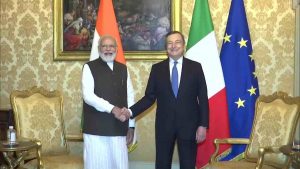Nearly a month after the first-person summit meeting between Prime Minister Narendra Modi and his Italian counterpart Mario Draghi in Rome, India-Italy relations continue to scale new heights. Transformative outcomes such as the forging of green energy partnership and greater coordination on matters relating to Afghanistan has opened new avenues of partnership. In this wide-ranging interview with Manish Chand, Founder-CEO, India Writes Network and India and The World magazine in New Delhi, Italian Ambassador to India Vincenzo de Luca shares his hope that new developments can open a new chapter in defence ties between the two countries.
Excerpts from the interview:
Q) Prime Minister Narendra Modi’s first in-person meeting with Italian PM Mario Draghi on the margins of the G20 summit in Rome was substantive and forward-looking? What, according to you, were most important deliverables from the summit meeting?
A) Let me start by saying that the presence in Rome of Prime Minister Modi has been a very important signal: a signal of the commitment of India towards multilateralism and of its willingness to play a constructive role in addressing today’s global challenges; and a signal of the excellent shape of India-Italy relations.
The meeting with Prime Minister Draghi was indeed both substantive and forward-looking. It confirmed that bilateral relations are consolidating around a shared agenda and in the framework of a five-year action plan, launched in 2020 and aimed at developing a stronger partnership in sectors like energy transition, advanced manufacture and defence.
Q) Scaling up bilateral trade and investment figured prominently in discussions between the two leaders. Is there a concrete plan of action to scale up economic ties? Are the two countries looking at bilateral trade target to achieve? Which sectors are Italian companies focusing on?
A) Strengthening our partnership in the economic and commercial field is a priority for both Italy and India and it has been clearly stated in the Virtual Summit between the two Prime Ministers of November 6, 2020. On that occasion, a Plan of Action for 2020-2024 was adopted, which identifies the main areas of cooperation in high technology, clean energy and energy sector development, infrastructure and food processing.
Since the adoption of the Action Plan, two important instruments have been put in place:
- the Fast-Track Mechanism, an informal forum to solve on friendly terms issues faced by our investors (such us market access barriers and other industry-related issues)
- the Digital Permanent Platform for Economic Cooperation, a direct channel of communication with Indian authorities, through the Italian Embassy in Delhi and Invest India, for Italian companies wishing to invest in India.
Further concrete steps have been taken last July, during the 21st meeting of the Italy-India Joint Commission for Economic Cooperation, chaired by the Italian Minister of Foreign Affairs and International Cooperation, Luigi Di Maio, and Indian Minister of Commerce and Industry Piyush Goyal.
The two Ministers reconfirmed the validity of the Plan of Action and the commitment to work together along three main lines: I) Promotion of Small and Medium Enterprises investments II) Cooperation in Start-ups III) Strategic Energy Transition partnership. The “Sistema Italia” in India – made up of institutions and private sector actors, under the coordination of the Embassy – is following-up on this with its day-by-day work.
Q) How do you look at the prospects of India-Italy defence cooperation, especially after new developments in this area (such as the lifting of ban on companies linked to Augusta Westland)?
A) I can say the prospects of India-Italy cooperation in the defence area are very positive. Some irritants from the past have just been overcome and a new chapter can be opened in defence ties. We are now negotiating a new bilateral agreement on security and defence, which will provide a solid framework for our partnership.
In the meantime, we are working for increasing the cooperation in the industrial domain, where some Italian champions are ready to offer to India their technological solutions in a wide range of sectors.

Q) Forging a comprehensive renewable energy partnership was the major outcome of the summit meeting between the PMs of India and Italy. Can we expect more investment by Italian renewable companies in India in near future? What about technology transfer?
A) Green transition is a challenge for every country, but even more so for India. As a fast-developing economy, India’s energy needs will boom in the coming years. We have to make sure that this demand for more energy is satisfied without jeopardising global efforts to counter climate change and at affordable social costs. Italy is partnering with India on this and is ready to engage with all its top companies in order to increase the production from renewable sources, promote energy efficiency, develop smart grids and storage technologies and modernize the electricity market.
In this process, investment and technology sharing will be key and we are actively encouraging Italian companies in providing both to India. The lessons learned from the experience of Italy’s regulation of the energy sector could be of inspiration to India.
Q) How do you look at India’s role in Afghanistan and prospects of enhanced coordination between India and Italy on issues relating to Afghanistan?
A) Italy and India have been in touch on the situation in Afghanistan since the very beginning. Prime Minister Modi had an exchange on the topic with Prime Minister Draghi already in August, only a few days after the American withdrawal. After that, Foreign Minister Jaishankar attended a G20 ministerial meeting organised by Italy in New York, and, more recently, Minister Modi took part in a virtual G20 summit on Afghanistan on October 12.
Italy and India share the same concerns about Afghanistan, recognising the need to act immediately to prevent a colossal humanitarian crisis and to avoid that the country becomes again a threat to international security. The role of the United Nations will be key in order to ensure an effective and non-discriminatory distribution of aid. The G20 Summit chaired by Italy also reconfirmed the strong expectation that the Afghan territory is not used to threaten or attack any country or to shelter or train terrorists. This remains a clear priority.
Q) Indo-Pacific has the potential to emerge as a major area of cooperation between India and Italy. How can the two countries enhance their cooperation in the Indo-Pacific? On the Indo-Pacific, does Italy shares the same vision as that of India?
The region is the most populated (3 fifths of the world population) and the most dynamic in the world (it accounted for 2 thirds of global growth in pre-pandemic times) and it is central to the interests of European countries. Just consider that trade exchanges between the Indo-Pacific and Europe are higher than those between any other regions in the world (1.5 trillion euro in 2019). Being an export-led economy, for Italy it is all the more important that the area remains free, open and stable and that the interactions among regional actors and global players rest on multilateral coordination and the rule of law. We have already engaged India in a dialogue on Indo-Pacific and are keen to keep working together also on this.
(Manish Chand is Founder-CEO of India Writes Network, India and the World magazine and Centre for Global India Insights, a think tank focused on global affairs.)
Author Profile

- Manish Chand is Founder and Editor-in-Chief of India Writes Network (www.indiawrites.org) and India and World, a pioneering magazine focused on international affairs. He is CEO, Centre for Global India Insights, an India-based think tank focused on global affairs.
Latest entries
 India and the WorldFebruary 17, 2026South-by-South: Focus on people-centric solutions at India AI summit
India and the WorldFebruary 17, 2026South-by-South: Focus on people-centric solutions at India AI summit India and the WorldFebruary 7, 2026Modi hails interim India-US trade deal, Goyal says no concessions made on agriculture
India and the WorldFebruary 7, 2026Modi hails interim India-US trade deal, Goyal says no concessions made on agriculture India and the WorldFebruary 2, 2026Trump announces trade deal with India, Modi ‘delighted’
India and the WorldFebruary 2, 2026Trump announces trade deal with India, Modi ‘delighted’ India and the WorldJanuary 31, 2026Palestinian minister bats for mediatory role for India in ending Gaza conflict
India and the WorldJanuary 31, 2026Palestinian minister bats for mediatory role for India in ending Gaza conflict








